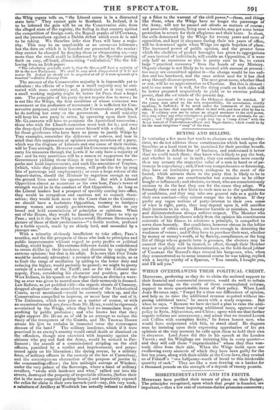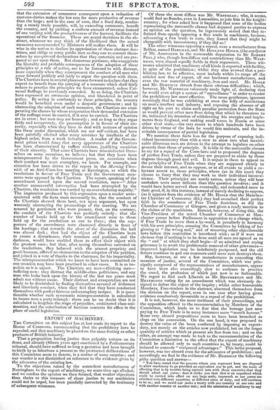MISREPRESENTATION AND ITS FRUITS. MINISTERS have perilled their tenure of
place on their Budget. The principles recognized, upon which that projet is founded, are important,—that a low rate of customs-duties promotes commerce; that the extension of commerce consequent upon a reduction of customs-duties makes the low rate far more productive of revenue than the large ; and in the case of corn, that a fixed duty, render- ing a steady trade possible, will, by extending commerce, benefit the country, and by yielding a uniform amount of revenue instead of one varying with the productiveness of the harvest, facilitate the operations of the financier. These are sound doctrines in the ab- stract, whatever we may think of the likelihood that the actual measures recommended by Ministers will realize them. It will be wise in the nation to declare its approbation of these abstract doc- trines, and oblige as many public men as they can to commit them- selves by unequivocal declarations that they entertain and are pre- pared to act upon them. But clamorous partisans, who exaggerate the liberality and probable consequences of the adoption of these principles as a rule of action, are to be listened to with distrust, more especially when they misrepresent the conduct of all men who come forward publicly and fairly to argue the question with them. The Chartists have in several places come forward to declare that they expect no benefit from the carrying of a measure which shall fairly reduce to practice the principles we have enumerated, unless Uni- versal Suffrage be previously conceded. In so doing, the Chartists have expressed an erroneous opinion, and blundered in point of policy. By acting in conformity to ;hese principles, the country would be benefited even under a despotic government ; and by obstructing the adoption of such measures, the Chartists are exas- perating the classes by whose cooperation their demanded extension of the suffrage must be carried, if it ever be carried. The Chartists are in error ; but men may err honestly ; and so long as they argue fairly and temperately, the presumption is in favour of their sin- cerity, especially when they have to deal with matters of opinion like these under discussion, which are not self evident, but have been painfully elicited after many mistakes by intellects of the highest order, from a weak induction. A reader of the Govern- ment prints would fancy that every appearance of the Chartists has been characterized by ruffian violence, justifying suspicion of their sincerity. That some Chartists have misconducted them- selves on some occasions, we believe ; but that they have been misrepresented by the Government press, on occasions when their conduct was most exemplary, we know. For example, our attention has been drawn to the report in the Morning Chro- nicle of an Anti-Corn-law meeting at Kensington, at which the resolutions in favour of Free Trade and the Government mea- sures were opposed by the Chartists. The report, speaking of the amendment moved upon the second resolution, says—" After another unsuccessful interruption had been attempted by the Chartists, the resolution was carried by an overwhelming majority." The impression produced by this expression upon a reader unac- quainted with the facts must necessarily be, that the conduct of the Chartists showed them bent, not upon argument, but upon wantonly obstructing the proceedings of the meeting. We are assured by gentlemen who were present, that, on the contrary, the conduct of the Chartists was perfectly orderly : that the number of hands held up for the amendment were to those held up for the resolutions as one to three ; that the sup- porters of the amendment were clustered directly in front of the hustings ; that towards the close of the discussion the ball was almost dark ; that had the object of the Chartists been to create a disturbance, their numbers and position, and the darkness, would have enabled them to effect their object with the greatest ease ; but that, after seeing themselves outvoted on the resolutions, they behaved with the utmost propriety and good-humour, Offered no obstruction to the adoption of the petition, and joined in a vote of thanks to the chairman, for his impartiality. The misrepresentation which we know to have been committed on one occasion may have been practised in other cases. It is as im- politic as it is unjust. The Chartists are men—thinking men— suffering men : they distrust the middle-class politicians, and any man who looks back upon the history of the last ten years must admit not without cause. Their distrust and exasperation are not likely to be diminished by finding themselves accused of dishonest and disorderly conduct, when they feel that they have conducted themselves with perfect fairness and exemplary temper. It is ques- tionable whether such systematic misrepresentation is calculated to insure men a party triumph : there can be no doubt that it is calculated to lengthen the reign of prejudice, embittered class-ani- mosities, and the substitution of factious contests for office in the place of useful legislation.



























 Previous page
Previous page